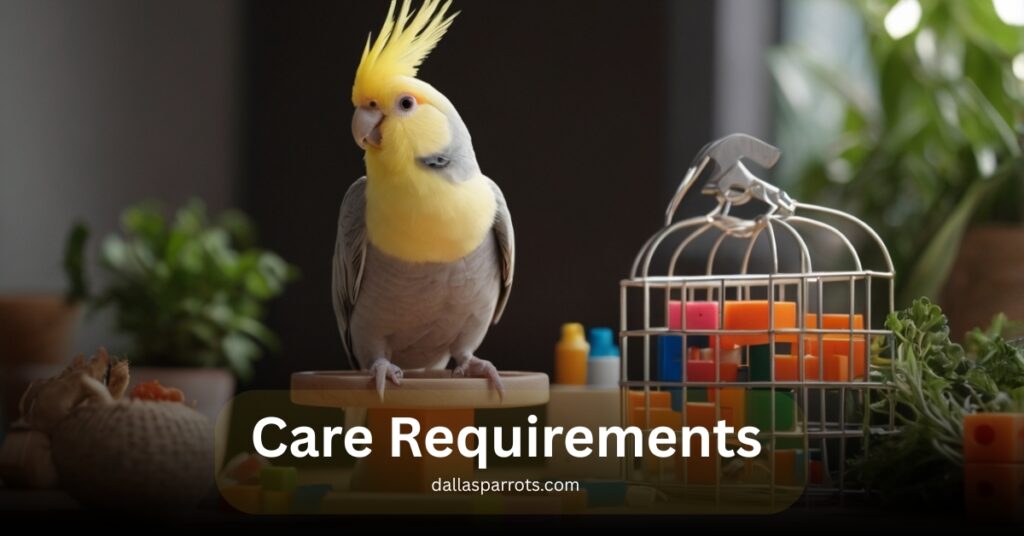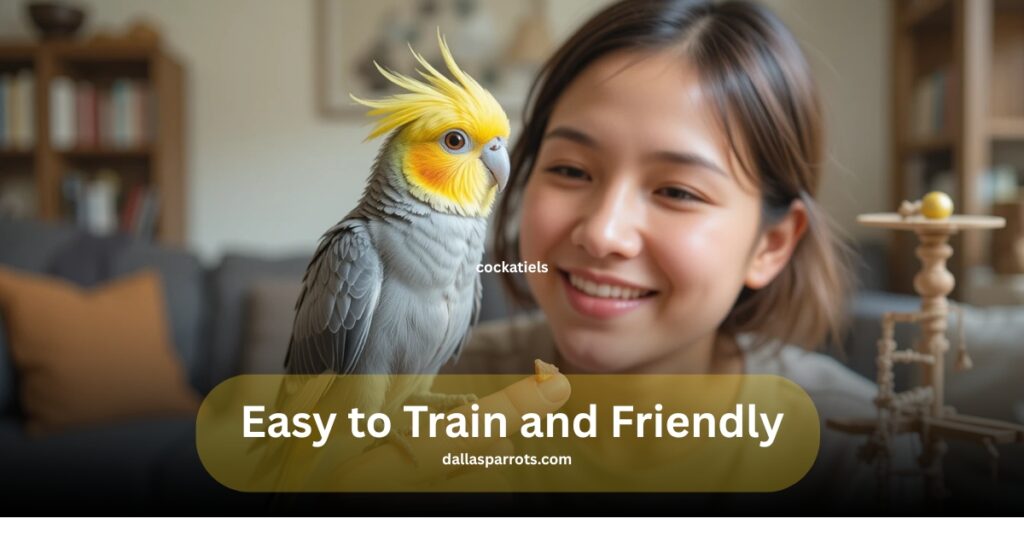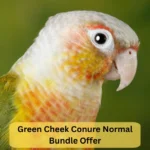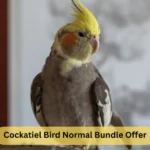

Top 2 cockatiel parrots make the best pet compared to other parrots
Cockatiel make ideal pets for apartments because of their manageable size (around 12 inches) and quieter nature compared to bigger parrots like Macaws. Their soft whistle and ability to mimic household sounds or simple tunes create a pleasant background soundtrack without causing noise complaints. I’ve always loved how they bond deeply with their owners, perching gentlely on your shoulder for companionship.
Trusted Parrot Care and Sales at Dallas Parrot
When it comes to quality care for your feathered companions in Texas, DallasParrot stands out as a family run aviary dedicated to healthy, hand raised parrots. As a longtime bird expert, I’ve seen how their services bring joy to every family whether you’re adopting a new parrot or stocking up on top tier supplies.
What makes them special? Their commitment to healthy, socialized birds and family friendly care ensures your new pet fits seamlessly into your home. From hand raised babies to trusted advice, they’re the go to source for parrot lovers across Dallas and beyond.
Featured Product Cockatiel Parrots
At DallasParrot, our hand picked cockatiels stand out because:
- Show stopping beauty with vibrant crests and colors
- Intelligent and quick to learn tricks
- Friendly personalities that bond deeply
- Playful nature keeps homes lively
- Hand raised for tameness and trust
- Groomed regularly for perfect health
- Complete health checks before adoption
We also offer:
- Professional boarding services
- Expert grooming sessions
- Training sessions for smart parrots
These feathered companions bring endless love and joy to any pet lover’s life.
What To Look For in a Pet Parrot
When selecting a parrot, prioritize size and noise level small birds like cockatiels are perfect for apartments as they’re easier to handle, require less care, and are far less loud than larger parrots that tend to scream. Their friendly nature makes them simpler to raise, while their modest cost and adaptability suit most homes, unlike more demanding species that can be hard to manage for beginners.
Size
Here’s why size should be your top consideration when choosing a parrot:
- Small parrots (like cockatiels) are ideal for most homes
- Require less cage space than larger species
- Much easier to handle for beginners
- Perfect for apartments or smaller living spaces
Medium to large parrots (like cockatoos and macaws):
- Need significantly more room and care
- Require specialized cage space
- Better suited for experienced owners
- May not adapt well to confined spaces
Noise Level
- Cockatiels are ideal for noise-sensitive owners, with their soft chirp and melodic whistle
- Unlike loud parrots that screech, these quieter birds adapt well to apartments
- Their pleasant vocalizations create peaceful environments without disturbing neighbors
- Perfect balance between vocal interaction and quiet companionship
Care Requirements
Cockatiels thrive on a simple diet (pellets, seeds, fresh veggies) compared to fussier parrots.

Low maintenance needs:
- Weekly cage cleaning
- Occasional nail clipping and grooming
- Basic toys for mental stimulation
Require daily out of cage time (2-4 hours) for bonding
Routine vet care (annual checkups) keeps them healthy
Cost
| Cost Category | Cockatiels (Budget Friendly) | Large Parrots (Expensive) |
| Initial Purchase | $200 – $500 | $1,000 – $3,000+ |
| Cage | $50 – $150 | $300 – $1,000+ |
| First-Year Vet | $100 – $200 | $200 – $500 |
| Annual Food | $75 – $150 | $300 – $600 |
| Annual Toys | $50 – $100 | $150 – $400 |
| Annual Vet Care | $100 – $200 | $200 – $500 |
| Total First Year | $575 – $1,100 | $2,150 – $5,000+ |
| Subsequent Years | $275 – $450/year | $650 – $1,500+/year |
Takeaways:
- Cockatiels cost 5-10x less than large parrots
- Large parrots require bigger/more expensive everything
- All parrots are long term financial commitments
- Initial purchase is just 10-20% of lifetime costs
Meet the Cockatiel
1. Fancy Cockatiel Bird $599.00
The Fancy Cockatiel stands out with its soft yellow face and unique grey feather pattern. It’s gentle, playful, and perfect if you want a bird that enjoys attention and learns tricks quickly yes, even riding a tiny bike.
2. Normal Cockatiel Bird $399.00 (Currently Out of Stock)
A classic choice for first-time bird owners, the Normal Cockatiel has warm tones, a calm personality, and builds strong bonds with its people. It may be simple in looks but shines in loyalty and affection.
| Feature | Specification |
| Size | 12-14 inches (30-35 cm) |
| Weight | 2.5-4 ounces (70-130 g) |
| Lifespan | 15-25 years |
Why They’re Ideal
- Perfect for beginners . Easier care than larger parrots
- Charming personality with expressive head crest and long tail
- Great first bird for new owners or experienced bird keepers alike
Friendly Features:
Here’s why cockatiels make wonderful companions:
- Affectionate birds that form strong bonds
- Perfect for first time owners with their gentle nature
- Highly social and loving interactive companionship
- Intelligent and full of personality charm
- Great for families and beginners alike
- Expressive crest shows their mood
- Soft, melodic whistles (not too loud)
- Calm demeanor makes them easy to handle
- Lower care requirements than most parrots
- Adaptable to different home environments
Side by Side Comparisons
When choosing a parrot, cockatiels strike a perfect balance that makes them ideal for most homes. Unlike tiny but bossy parrotlets or chatty budgies, cockatiels offer loving companionship with their cuddly nature and soft whistling of tunes far quieter than the piercing sounds of Quaker parrots or demanding large parrots like Amazons and macaws. Their smaller size (12-14 inches) needs less space than giant species but feels more substantial than pocket sized alternatives. While budgies suit beginners and parrotlets challenge owners with big personalities, cockatiels deliver calm, easier care with just enough affection and intelligence to delight most people without overwhelming them. Whether you want a first bird or a feathered friend that fits seamlessly into family life, cockatiels consistently rise to the top.
Cockatiel Vs Large Parrots (Macaws, Amazons):
Here’s a clear comparison table between cockatiels and large parrots:
| Feature | Cockatiels | Large Parrots (Macaws/Amazons) |
| Size | 12-14 inches (smaller) | 30-40 inches |
| Space Needs | Fits apartments | Requires large environments |
| Noise Level | Soft chirps & whistles | Loud, piercing calls |
| Daily Care | Easier to manage | Demanding grooming needs |
| Diet | Simple requirements | Specialized nutritional needs |
| Best For | Urban homes/apartments | Spacious homes with owners who can dedicate significant time |
Cockatiel Vs Budgies (Parakeets):
| Feature | Cockatiels | Budgies |
| Sounds | Soft whistle, can mimic simple tunes | Constant chatter, less melodic |
| Interaction | Cuddly, enjoys affection | Playful but less hands on |
| Care | Low maintenance, needs moderate space | Extremely easy care, needs less space |
| Communication | Expressive crest, whistling | More vocal with rapid chirps |
| Best For | Owners wanting affection | Those preferring lively activity |
Differences:
- Cockatiels bond deeply through communication and whistles
- Budgies entertain with non stop chatter but show less affection
- Both are low maintenance, but cockatiels need slightly more space
Cockatiel Vs Parrotlets:
Differences at a Glance
| Feature | Cockatiels | Parrotlets |
| Noise Level | Quieter soft chirps & whistles | More vocal – frequent high pitched sounds |
| Personality | Social, enjoys human interaction | Territorial, can be feisty |
| Training | Responsive to bonding & tricks | Smart but more independent |
| With Children | Gentle, good for families | Better for calm, older kids |
| Living Spaces | Adapts well to apartments | Needs secure space (can escape) |
| Company | Thrives on attention | More self entertaining |
Which One Fits Your Lifestyle?
- Choose Cockatiels if you want:
- A quieter, affectionate companion
- Easy training and bonding
- A pet that enjoys family company
- Choose parrotlets if you prefer:
- A bold, independent bird with big personality
- Compact size (but louder than expected!)
- A challenge for experienced owners
Best For:
- Cockatiels → First-time owners & social households
- Parrotlets → Experienced bird lovers who appreciate spunk
Cockatiel Vs Quaker Parrots:
| Feature | Cockatiels | Quaker Parrots |
| Temperament | Gentle, affectionate | Bold, highly social |
| Noise Level | Quiet (soft whistles) | Loud (chatty, can scream) |
| Space Requirements | Moderate (fit most living spaces) | Needs more room (active flyers) |
| Bonding | Strong with people | Attached but demanding |
| Social Needs | Enjoy companionship | Require constant interaction |
| Best For | Calm households, beginners | Experienced owners, lively situations |
Why Cockatiels Stand Out
For bird lovers seeking the ideal combination of charm and practicality, cockatiels deliver where other parrots fall short. Their compact size makes them perfect for apartment living, unlike larger species that need expansive spaces.
some birds fill homes with harsh, noisy squawks, cockatiels offer soft whistling and pleasant sounds that won’t disturb neighbors. They’re remarkably friendly and bond easily with people, responding well to training whether you’re teaching fun tricks or enjoying their natural mimicry.
Even the cost is reasonable, from initial purchase to ongoing care, making them accessible to most budgets. Whether you’re a first time owner or an experienced enthusiast, cockatiels strike that rare balance between interactive companionship and low maintenance quiet that truly makes them stand out in the avian world.
Quiet Compared to Larger Parrots:
When it comes to noise levels, cockatiels are the clear winner for households that value peace. While macaws and amazons can reach over 100 decibels louder than a conversation at a busy restaurant cockatiels stay around 70 decibels, with soft chirps and melodic whistles that blend into the background.
Their quieter nature makes them perfect for apartment living, where loud vocalizations could disturb neighbors. Unlike larger parrots that demand attention with piercing screams, cockatiels offer pleasant noise levels that won’t overwhelm your space. If you want parrot companionship without the ear splitting volume, cockatiels are the ideal choice.
Easy to Train and Friendly:
Cockatiels are intelligent and eager to interact, making them relatively easy to train. They can learn simple tricks and commands, and many enjoy human companionship, forming strong bonds with their owners.

Perfect Size, Moderate Cost ($80–$250):
Cockatiels hit the sweet spot for bird enthusiasts their compact size (just 12–14 inches) makes them easy to house, while their affordable price ($80–$250) puts them within reach for most budgets.
Unlike larger parrots that demand expensive cages and specialized care, cockatiels offer all the charm of a parrot without the hefty cost. Whether you’re a first time owner or a seasoned bird lover, their manageable size and reasonable price make them a standout choice.
Caring for Your Cockatiel
To keep your cockatiel happy and healthy, give it a roomy cage, a good mix of food, fun toys, and daily attention. The cage should be big enough for moving around and safe for climbing.
Feed mostly pellets, with some fresh fruits and veggies no avocado, onion, or garlic. Add safe toys and change them often to keep your bird busy. Keep the cage clean, take your bird to the vet once a year, and trim nails as needed. A clean, safe space helps your bird stay healthy and feel loved.
Basic Care: Cage, Diet, Toys, and Daily Interaction
Cage Setup
- Size: 24 x 18 x 24 inches is the minimum; greater is preferred.
- Bar spacing: 1/2″ to 3/4″ (prevents escapes)
- Placement: In a social area for stimulation
Diet Essentials
- 60-70% high quality pellets (base diet)
- 10% seeds (as occasional treats)
- Daily fresh vegetables & fruits (avoid avocados, onions, garlic)
Toys & Enrichment
- Rotate different toys weekly (wood, cardboard, paper)
- Include climbing ropes/ladders
- Prevents boredom and encourages exercise
Daily Interaction
- 1-2 hours of supervised out of cage time
- Essential for bond building
- Keep play areas safe
Health Tips: Veterinary Care and Clean Environment
Veterinary Care
- Schedule annual avian veterinarian visits for checkups
- Watch for health issues: lethargy, fluffed feathers, or changes in appetite
- Trim nails and clip wings (or have a veterinary professional do it)
- Address injury or illness promptly birds hide symptoms
Clean & Safe Environment
- Clean cage weekly (replace bedding, scrub perches)
- Avoid toxic fumes (non stick pans, aerosols, smoke)
Emergency Signs
- Labored breathing, discharge, or balance issues
- Sudden weight loss or lack of grooming
- Professional help is critical for these symptoms
Comparison Table for Easy Reading
| Feature | Cockatiel | Budgie | Parrotlet | Amazon/Macaw |
| Size | Medium | Small | Small | Large |
| Noise Level | Low–Medium | Medium | Low | High |
| Affection | High | Medium | Low | Varies |
| Lifespan | 15–20 yrs | 7–15 yrs | 15–30 yrs | 50–80 yrs |
| Cost | $80–$250 | $10–$100 | $50–$150 | $1,000+ |
Quick Buying Checklist
CAGE REQUIREMENTS
- Dimensions: 24″ (L) × 18″ (W) × 24″ (H) minimum
- Material: Powder coated steel / Stainless metal bars
Placement:
- Well lit area
- Away from kitchens (Teflon fumes)
- No direct drafts
BIRD SELECTION
- Hand raised young chick (best for bonding)
- Active and curious behavior
ESSENTIAL SUPPLIES
- Base diet: High quality pellets + seeds
- Rotating toys: Wood, paper, cardboard
- Travel carrier (for vet visits)
SAFETY PROTOCOLS
- Remove household hazards
- Schedule avian vet exams
- Daily social interaction
Why Bird Owners Choose Dallas Parrot Again and Again
At DallasParrot, we understand that birds aren’t just pets they’re family. That’s why our family run business focuses on health checks, proper grooming, and expert hand feeding to ensure your bird thrives. Whether you need boarding services or tips to socialize your pet, our team provides unmatched support. Unlike big box sellers, we treat every bird with love, offering personalized cares that keep owners coming back. From our aviary to your home, we’re here to help your feathered companion live its best life.
Benefits:
- Health first approach with thorough screenings, gender testing, and health certificates
- Expert guidance from our knowledgeable, patient team
- Multiple support options: chats, video consults, and in person help
- Ethical practices with hand aised birds for better bonding
- Complete care services including spa treatments, grooming, and boarding
- Clean, comfortable aviary and store setup
- Ongoing after sale support through messages and interaction advice
- Special focus on new bird owners with friendly education
Customer Reviews:
- “”The staff answered all my nervous firs time questions our baby Quaker is thriving!”
(Riya K., Houston) - “Reached out after hours when we had concerns that’s real care!”
(The Gonzalez Family, San Antonio) - “Prepared us perfectly our blue Quaker came home healthy and happy!”
(David & Priya M., Dallas) - “Superb knowledge! Educated us for hours before we chose our bird.”
(Dr. Ellen Park, Austin) - “Most accommodating store clean facility, experienced, friendly staff.”
(Michael T., Fort Worth) - “Nice people who genuinely care about birds and customers.”
(Aisha R., College Station)
Contact us :
Need help with your feathered companion? Whether you have questions about bird care, want to explore our services, or just want to visit our home like aviary, we’re here for you
Reach out to us anytime because every friend with wings deserves expert care. Contact us today and let’s make your bird’s life happier and healthier
Conclusion:
Cockatiels make the best pet parrots because they perfectly balance affection, intelligence, and low maintenance care. Their compact size (12–14 inches) fits easily in apartments, while their soft whistles and chirps are far quieter than loud parrots like macaws or Quakers.
Highly social and easy to train, they bond deeply with owners, offering playful companionship without demanding constant attention. With a budget friendly cost ($80–$250), simple dietary needs, and a lifespan of 15–25 years, they’re ideal for both beginners and experienced bird lovers. Compared to larger, noisier, or more aggressive parrots, cockatiels provide the perfect mix of charm and practicality, making them the top choice for a feathered friend.
FAQ's
What makes cockatiels ideal pets for apartments?
Their small size (12-14 inches), quiet nature with soft whistles, and adaptability make them perfect for apartments without causing noise complaints.
Why choose Dallas Parrot for cockatiel adoption?
Dallas Parrot offers hand-raised, healthy, socialized cockatiels with health checks, grooming, and ongoing support, ensuring a smooth transition to your home.
What are the key features of cockatiels?
Cockatiels are affectionate, intelligent, playful, and bond deeply. They have vibrant crests, learn tricks, and have a calm demeanor, ideal for beginners.
How do cockatiels compare to budgies and parrotlets?
Cockatiels are cuddlier and quieter than chatty budgies or feisty parrotlets, offering a balance of affection and low maintenance for families.
Why are cockatiels easier to train than other parrots?
Their intelligence and social nature make them responsive to training (e.g., tricks, commands), forming strong bonds with minimal effort.


